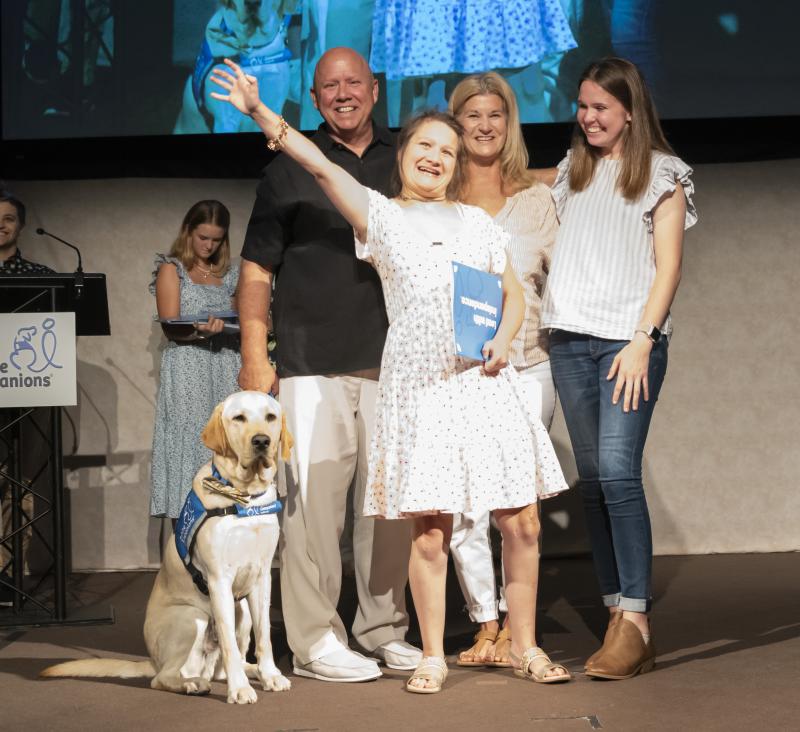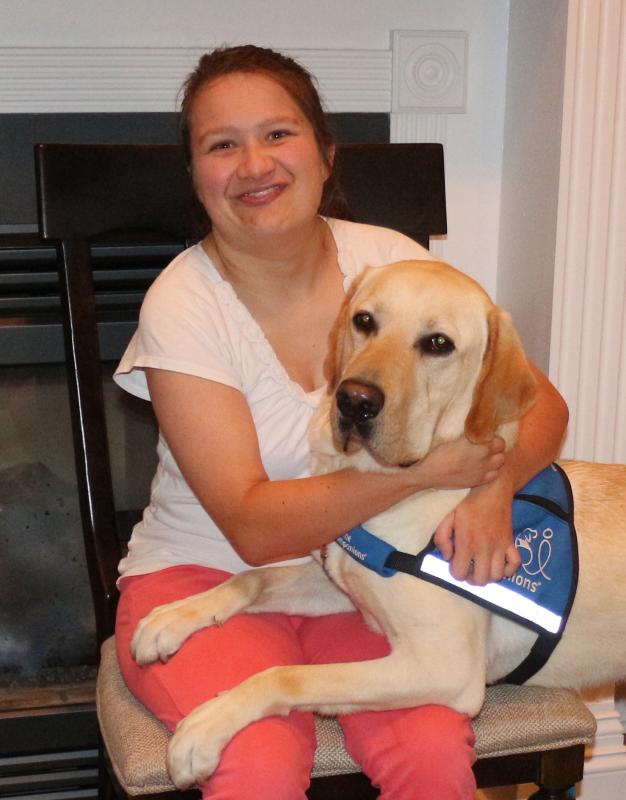Jazmin Tinsley bonds and blooms with service dog Bonus
Jazmin Tinsley is a happy and determined young woman who loves stickers and anime, particularly the Sailor Jupiter and Sailor Mars characters from the Sailor Moon manga series.
In her 23 years, Jazmin has encountered a number of health-related issues, including diagnoses of autism and low muscle tone cerebral palsy, meaning her muscles are relaxed and lack stability.
Due to her disability, Jazmin has limited use of her hands and often uses assistive technology on her phone to help her communicate. She’s received numerous therapies and undergone multiple surgeries on both legs, and had a feeding tube until she was 18.
“The goal was to get her to walk,” said her father, Kevin. “She has hardware all over her legs.”
While a Sussex Consortium student, Jazmin worked with pre-K Little Vikings students in small-group settings. She wants to be a teacher like her mother, Sandy, who works in the Milford School District.
Jazmin now has a job coach through CIS Works, an organization that helps people with disabilities find jobs through partnerships with public agencies, businesses and schools. For more than a year, Jazmin has worked at Ann Taylor Factory, where she checks shipments and arranges clothing on hangers for display.
Years ago, a customer brought a service animal to the market where her older brothers worked while college students, and the family subsequently began researching how such an animal might assist Jazmin. At the time, she was less talkative and more introverted, Kevin said.
That’s when they discovered Canine Companions. Founded in 1975, the nonprofit organization provides service dogs to adults, children and veterans with disabilities, and facility dogs to professionals working in healthcare, criminal justice and educational settings.
All dogs and follow-up services are provided at no cost; Canine Companions is funded by contributions and gifts, grants and ongoing fundraising activities, and is supported by thousands of nationwide volunteers.
Canine Companions has its own breeding program, said Public Relations and Marketing Coordinator John Bentzinger, who noted most dogs are golden retrievers, Labrador retrievers, or a cross of the two breeds.
Once weaned at 8 weeks, these pups with a purpose are relocated to the homes of volunteer puppy raisers, who socialize and train the dogs with basic commands that serve as building blocks for more advanced instruction that comes later.
“We want the dogs to be in as many types of situations as possible, so they can be as comfortable on the streets of Manhattan as they are in a rural setting,” Bentzinger said.
After 18 months, the dogs return to Canine Companions, where the higher-level training begins. For six months, professional instructors teach the dogs how to complete tasks such as opening and closing doors, turning lights on and off, and picking up dropped items as small as a dime.
The dog is then ready to be matched with a person who has a disability, which occurs at one of Canine Companions’ regional training centers during an intensive two-week group class. Students learn to manage their dog’s behavior and direct them to respond to commands.
Jazmin applied and was on the waiting list for three years until she received her first service dog, Ohio, about nine years ago when she was 15.
The age at which a service dog retires is not set in stone, Bentzinger said; rather, it is determined based on yearly recertifications, during which the dog’s health and ability to continue working are evaluated, and a target retirement date set.
Canine Companions retains ownership of the dog through its working life, Bentzinger said, and once the dog is ready to retire, the family has the first option to adopt the dog as a pet.
The Tinsleys chose to adopt Ohio, and applied to receive a successor service dog. In August, they were matched with Bonus, a 2-year-old golden retriever-lab mix.
“He’s a highly trained tool,” Kevin said, noting the family learned how to teach Bonus commands that will benefit Jazmin the most.
The family has continued working with Bonus in the weeks since they returned to Rehoboth; he already knows 50 verbal commands, including the most important one – tug – which he will follow to help Jazmin take her socks off and remove clothes from the dryer, for instance.
“He will really learn us and our patterns, and he will learn her mannerisms,” Sandy said. “He will learn, and they will grow together. It’s neat to see what’s happening already. She’s the only one who feeds him right now. He will always be loyal to her.”
Bentzinger noted that September is National Service Dog Month, which recognizes the difference trained service dogs can make in the life of a person with disabilities.
“The strides Jazmin has made since she came for her first dog are nothing short of remarkable,” Bentzinger said.
“So many kids and adults could benefit,” said Kevin, who also noted October is National Disabled Employment Awareness Month. “This could help so many people.”

















































